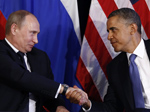 AFP: After a passage of wild Syria diplomacy, President Barack Obama was Tuesday sizing up a political lifeline offered by the most unusual of suspects — his chilly rival Russia.
AFP: After a passage of wild Syria diplomacy, President Barack Obama was Tuesday sizing up a political lifeline offered by the most unusual of suspects — his chilly rival Russia.
By Stephen Collinson
 WASHINGTON (AFP) — After a passage of wild Syria diplomacy, President Barack Obama was Tuesday sizing up a political lifeline offered by the most unusual of suspects — his chilly rival Russia.
WASHINGTON (AFP) — After a passage of wild Syria diplomacy, President Barack Obama was Tuesday sizing up a political lifeline offered by the most unusual of suspects — his chilly rival Russia.
Moscow’s sudden call for its ally Damascus to put its chemical arms under international supervision had immediate reverberations in tense and divided Washington.
The odds still seem long that President Bashar al-Assad will agree to a deal to neuter the chemical arsenal he may see as an insurance policy in an existential battle with rebels.
And any eventual agreement would be fraught with obstacles — not least in implementation and verification.
The White House also fears the plan may be a ruse to buy time with prowling US warships poised to loose off cruise missiles at Syrian targets.
Plus, suspicion runs high here over Russia’s motives, with relations as tense as at any time since the Cold War.
But the speed with which Obama embraced the idea hinted at the depth of his political isolation — as support fast ebbs for military action in Congress, and with his credibility as a world statesman in doubt.
In television interviews Monday, Obama hailed the nascent Russian plan as a “potentially positive” development.
“It’s possible, if it’s real,” the president told CNN.
Obama had planned to use a national prime time address on Tuesday to beseech skeptical Americans to embrace his plan for air strikes to punish a chemical weapons attack in Syria on August 21 which Washington said killed 1,400 people.
But the idea of another US venture into the Middle East cauldron is a tough sell to a public weary of war — and for many of their leaders on Capitol Hill, who see the White House plan as foggy and undefined.
But now, when Obama strolls in to the East Room of the White House at 0100 GMT, he can at least, however improbably, claim direction for a policy that had seemed in disarray.
The new White House spin is that Obama’s lonely call for military action was the catalyst for the emerging Russian plan.
Hopes of a breakthrough came on a day when Obama’s political peril deepened as more lawmakers, including a number of Democrats came out against military action.
Last week, the White House had seemed confident the Senate would line up behind the president. But the venerable chamber seems infected by strong anti-war feeling in the House of Representatives.
Democratic Senate Majority leader Harry Reid — given cover by the Russian plan — decided to put off a Senate test vote expected for Wednesday — sparing the White House a cliffhanger.
Hopes of a breakthrough or not, Obama still faces an almost impossible political task in selling possible new military action in the Middle East on Tuesday.
He has after all publicly argued against a US role in Syria for two years, and made no secret of his desire to disengage from the Middle East.
A CNN poll found Monday that six in ten Americans were against launching military strikes — a political reality that has lawmakers deserting Obama in droves.
In an age when a president’s power to dictate a narrative is challenged by a fractured media environment — Obama is struggling to turn the tide.
Professor Thomas Baldino, an expert in the presidency at Wilkes University, said set-piece presidential speeches are rarely decisive.
“In my lifetime, I cannot think of a single speech that materially changed public opinion,” Baldino said.
“There have been speeches that have been uplifting but once public opinion is on a track, it is really difficult to reverse that momentum.”
Obama has made a fervent moral case for punishing Assad warning a dictator must not be allowed to gas women and children with impunity. He also warns Iran is watching how Washington responds to the infringement of international norms.
But he admits, his effort may be futile.
“I’m not sure we are ever going to get a majority of the American people,” Obama told PBS television.
But he pledged to clear up confusion on his goals in Syria — partly sown by inconsistent White House messaging.
“This isn’t like Iraq, it’s not like Afghanistan,” he said, promising only limited military action.
Obama said he will also stress the humanitarian dimension.
“Any parent who sees those videos of those children being gassed, I think understands what a human tragedy it is.”
But rarely in his presidency — perhaps only after mass shootings in Connecticut and Arizona, has Obama approached the kind of emotional connection with his country that he would need to reverse public opinion.
A possible opening in the Syria crisis emerged after Secretary of State John Kerry gave voice to the possible plan in an apparently throwaway remark in London.
The State Department denied it was a serious proposal but Russian Foreign Minister Sergei Lavrov took the remarks at face value, and the idea quickly gained support in Europe.
Then the White House picked up the ball — and Obama soon was even claiming partial ownership, saying he had discussed the notion with Putin last year in Mexico and last week in Russia.


